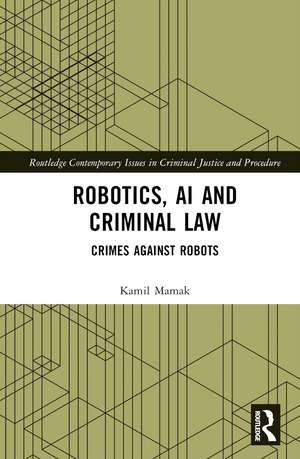Robotics, AI and Criminal Law: Crimes Against Robots: Routledge Contemporary Issues in Criminal Justice and Procedure
Autor Kamil Mamaken Limba Engleză Hardback – sep 2023
It will be of interest to researchers and academics working in the areas of Criminal Law, Technology and Law and Legal Philosophy.
Din seria Routledge Contemporary Issues in Criminal Justice and Procedure
-
 Preț: 325.64 lei
Preț: 325.64 lei -
 Preț: 183.65 lei
Preț: 183.65 lei -
 Preț: 311.41 lei
Preț: 311.41 lei - 9%
 Preț: 969.87 lei
Preț: 969.87 lei -
 Preț: 311.41 lei
Preț: 311.41 lei - 18%
 Preț: 126.03 lei
Preț: 126.03 lei -
 Preț: 311.59 lei
Preț: 311.59 lei -
 Preț: 384.71 lei
Preț: 384.71 lei - 9%
 Preț: 935.34 lei
Preț: 935.34 lei -
 Preț: 385.30 lei
Preț: 385.30 lei -
 Preț: 308.83 lei
Preț: 308.83 lei -
 Preț: 310.12 lei
Preț: 310.12 lei -
 Preț: 326.11 lei
Preț: 326.11 lei - 5%
 Preț: 370.18 lei
Preț: 370.18 lei -
 Preț: 198.45 lei
Preț: 198.45 lei -
 Preț: 386.61 lei
Preț: 386.61 lei - 18%
 Preț: 1112.90 lei
Preț: 1112.90 lei -
 Preț: 390.80 lei
Preț: 390.80 lei - 18%
 Preț: 1001.70 lei
Preț: 1001.70 lei - 18%
 Preț: 990.60 lei
Preț: 990.60 lei
Preț: 1001.90 lei
Preț vechi: 1221.83 lei
-18% Nou
Puncte Express: 1503
Preț estimativ în valută:
191.71€ • 200.70$ • 158.63£
191.71€ • 200.70$ • 158.63£
Carte tipărită la comandă
Livrare economică 05-19 aprilie
Preluare comenzi: 021 569.72.76
Specificații
ISBN-13: 9781032362793
ISBN-10: 1032362790
Pagini: 144
Ilustrații: 1 Halftones, black and white; 1 Illustrations, black and white
Dimensiuni: 156 x 234 x 11 mm
Greutate: 0.5 kg
Ediția:1
Editura: Taylor & Francis
Colecția Routledge
Seria Routledge Contemporary Issues in Criminal Justice and Procedure
Locul publicării:Oxford, United Kingdom
ISBN-10: 1032362790
Pagini: 144
Ilustrații: 1 Halftones, black and white; 1 Illustrations, black and white
Dimensiuni: 156 x 234 x 11 mm
Greutate: 0.5 kg
Ediția:1
Editura: Taylor & Francis
Colecția Routledge
Seria Routledge Contemporary Issues in Criminal Justice and Procedure
Locul publicării:Oxford, United Kingdom
Public țintă
PostgraduateCuprins
1. Introduction 2. The Moral Status of Robots 3. Robots as Humans 4. Mistreatment of Robots 5. Sex Robots 6. Relations with Robots 7. Robots, Artificial Intelligence, and Religions 8. Police Robots
Recenzii
"Can you murder a robot? Kamil Mamak’s recent book on robots - embodied and operating in our daily lives - argues the case. Based on his fascinating combination of philosophical concepts and criminal law theory with a grounding in Polish law, he implores what human-robot-interaction has in it for fleshy readers who think beyond the digital-analogue divide. The inquiry is a must for lovers of androids."
Sabine Gless, Professor of Criminal Law and Criminal Proceedings at the University of Basel (Switzerland) and co-author of If Robots Cause Harm Who is to Blame?, 19 NCLR 412-436 (2016)
"This ground-breaking book flips the script on robots and criminal law. Instead of examining unlawful actions done with robots, it investigates improper acts perpetrated against robots. In doing so, author Kamil Mamak develops an innovative method for protecting embodied, socially interactive technology that both challenges and revolutionizes existing property law."
David J. Gunkel, Professor at Northern Illinois University (USA) and author of Robot Rights
"A unique selling point of this excellent book is that Kamil Mamak draws both on an extensive knowledge of the philosophical literature on the ethics of human-robot interaction and an equally extensive knowledge of legal theory. Using Polish law as an illuminating case study, Mamak expertly investigates potential crimes against robots."
Sven Nyholm, Professor of the Ethics of Artificial Intelligence at the Ludwig Maximilian University of Munich (Germany), and author of Humans and Robots: Ethics, Agency, and Anthropomorphism and This is Technology Ethics: An Introduction.
Sabine Gless, Professor of Criminal Law and Criminal Proceedings at the University of Basel (Switzerland) and co-author of If Robots Cause Harm Who is to Blame?, 19 NCLR 412-436 (2016)
"This ground-breaking book flips the script on robots and criminal law. Instead of examining unlawful actions done with robots, it investigates improper acts perpetrated against robots. In doing so, author Kamil Mamak develops an innovative method for protecting embodied, socially interactive technology that both challenges and revolutionizes existing property law."
David J. Gunkel, Professor at Northern Illinois University (USA) and author of Robot Rights
"A unique selling point of this excellent book is that Kamil Mamak draws both on an extensive knowledge of the philosophical literature on the ethics of human-robot interaction and an equally extensive knowledge of legal theory. Using Polish law as an illuminating case study, Mamak expertly investigates potential crimes against robots."
Sven Nyholm, Professor of the Ethics of Artificial Intelligence at the Ludwig Maximilian University of Munich (Germany), and author of Humans and Robots: Ethics, Agency, and Anthropomorphism and This is Technology Ethics: An Introduction.
Notă biografică
Kamil Mamak is a philosopher and a lawyer. He is a postdoctoral researcher at the RADAR: Robophilosophy, AI ethics and Datafication research group at the University of Helsinki, Finland, and an assistant professor at the Department of Criminal Law at the Jagiellonian University, Poland. He is also a Member of the Board of the Cracow Institute of Criminal Law, Poland.
Descriere
This book offers a phenomenological perspective on the criminal law debate on robots. Today, robots are protected in some form by criminal law. This book presents the different rationale for protecting robots beyond the property justification based on the phenomenology of human-robot interactions.
